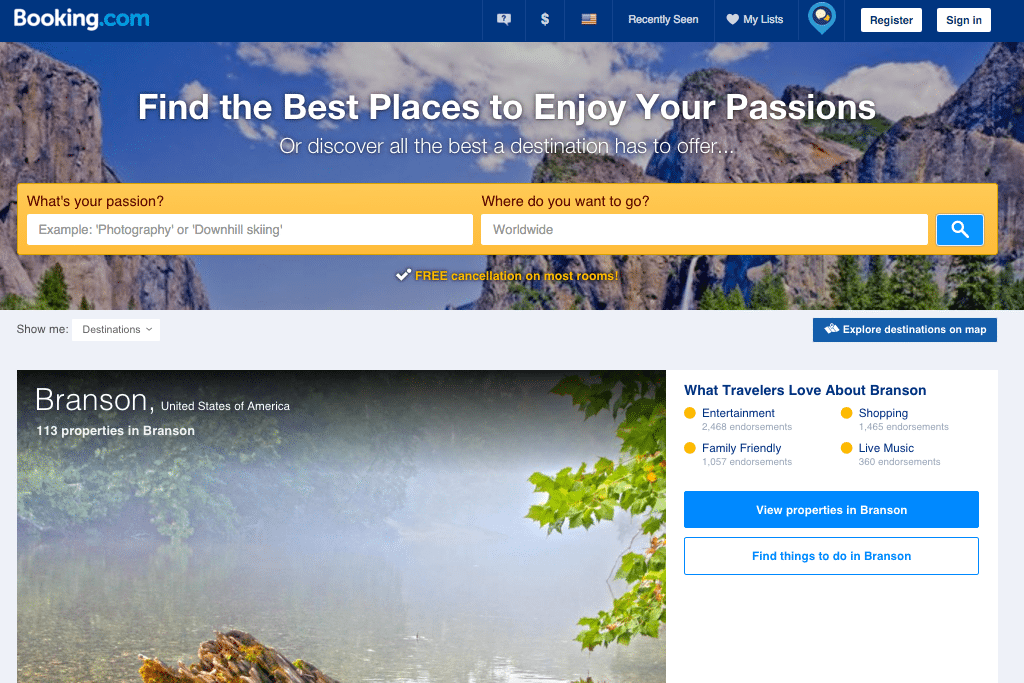Skift Take
Expedia and Booking.com are wildly successful because they're great at converting travel shoppers into buyers. In order to keep growing, however, they'll need to move further up the "purchase funnel" to capture travelers who are still in the research phase. New search features may be the way to do it.
This week we’re talking about search and how it impacts travel purchases.
Online travel agencies like Booking.com and Expedia have become exceedingly efficient at converting shoppers who have reached the “last mile” of their travel purchase process into paying customers. But what about the vast majority of online travel shoppers who are still window shopping or early in their decision-making process? This presents a much more complicated technical problem, even more so now that more searches are happening on mobile devices.
Perhaps the best sign that online booking players are getting serious about the problem is an evolution in how these companies handle customer search queries. Companies like Booking.com and Google are rolling out new search results features in recent months that increasingly try to help customers answer more vague trip planning questions like where to go or what to do. Is it a gimmick? Or will this new functionality boost traveler purchases? Read on below for more analysis.
Booking.com Redesigns Search to Cater to Mobile, Traveler Passions
Booking.com recently announced a redesigned search experience on its .com and mobile platforms, allowing customers to look for travel products based on their specific interests. The move marks an interesting overall shift in how the biggest online booking platforms try to convert travel customers. Having already dealt with the “low-hanging fruit” of travelers with specific dates and destinations in mind, the new search tools seem to position Booking.com to capture more sales from travelers who are earlier in their purchase process. Read more
Google Revamps Mobile Search with New Trip Planning Features
Following a similar theme as this week’s search news from Booking.com, Google also appears to be experimenting with a new format for travel-themed mobile search results. The company is experimenting with split search results for general travel queries like “where to go in France,” with distinct results organized around “trip planning” and “exploration.” The “trip planning” tab is of particular interest, given that it helps search users estimate average costs for hotel and airfare at different times of the year. Read more
Expedia Uses App to Enable Direct Chats Between Travelers and Hotels
One persistent issue with booking a hotel room through a third-party travel site like Expedia is that customers often are unsure who to contact if they have follow-up questions before their stay. Expedia is attempting to streamline the process through its PartnerCentral mobile application, a tool that allows booking partners to more easily communicate with customers prior to the stay. Given that many hotels are actively trying to encourage direct booking, Expedia’s new app also appears to be a strategic move to placate hotel owners. Read more
United Airlines Adds Amenity Details to Search Results on Routehappy
United is now the first airline to display details about its in-flight amenities using air travel differentiation platform Routehappy. As ancillary purchases like Wi-Fi and seat upgrades become more important to aviation industry profitability, more airlines are working to make sure travel customers are offered these up-sell services wherever they happen to research or buy online. United plans to roll out the in-flight amenity information to a variety of third-party booking platforms like Kayak, Google, Expedia and Sabre in the near future. Read more
Hotel SEO Study Reiterates Importance of Quick-Loading Websites
Trying to stay on top of the latest news in search engine optimization can feel like an exhausting, never-ending game. One factor that’s easy to forget is that Google factors how quickly a website loads into its search rankings. A recent study of hotel websites found that luxury hotel properties were among the worst-performing in terms of page loading speed. Read more
Dallas Fort Worth Airport Offers New Apple Watch App
Though many travel executives express interest in the marketing potential of the Apple Watch, the number of brands that offer apps for the device (compared for instance, with smartphones) remains limited. The Dallas Fort Worth Airport is one travel brand bucking the trend, announcing this week a new iOS and Android app experience plus a new Apple Watch app as well. Once it’s been synced with the mobile app, the smartwatch application is designed to let travelers receive real-time flight information and notifications. Read more
The Daily Newsletter
Our daily coverage of the global travel industry. Written by editors and analysts from across Skift’s brands.
Have a confidential tip for Skift? Get in touch
Tags: content marketing, Digital Marketing
Photo credit: Booking.com's new search feature helps travelers explore destinations based on their interests. Booking.com
